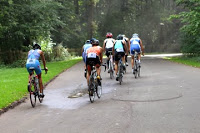Defying Father Time: Elite Athletes Career Longevity
Thursday, December 5, 2013 - 09:58
The  As we age, our bodies change and we are simply not able to do certain things in the same way as we could when we were young. With aging in athletic terms, we must evolve and come to understand our limits, learning strategies to compensate for those limits. Even as a recreational athlete, you can age successfully. Even though your body does not work in the way that it used to, you can adapt to the changes. Maybe playing fewer minutes or fewer games might be the solution for you; little changes like this can make a big difference in terms of allowing you to keep enjoying being active.
As we age, our bodies change and we are simply not able to do certain things in the same way as we could when we were young. With aging in athletic terms, we must evolve and come to understand our limits, learning strategies to compensate for those limits. Even as a recreational athlete, you can age successfully. Even though your body does not work in the way that it used to, you can adapt to the changes. Maybe playing fewer minutes or fewer games might be the solution for you; little changes like this can make a big difference in terms of allowing you to keep enjoying being active.
References from the SIRC Collection:
1. Abel E, Kruger M. Longevity of Major League Baseball Players. Research In Sports Medicine. January 2005;13(1):1-5.
2. Abel E, Kruger M. The Healthy Worker Effect in Professional Football. Research In Sports Medicine. October 2006;14(4):239-243.
3. Albuquerque M, Menezes Lage G, Fernandes Malloy-Diniz L, et al. RELATIVE AGE EFFECT IN OLYMPIC TAEKWONDO ATHLETES. Perceptual & Motor Skills. April 2012;114(2):461-468.
4. Buśko K, Michalski R, Mazur J, Gajewski J. JUMPING ABILITIES IN ELITE FEMALE VOLLEY-BALL PLAYERS: COMPARATIVE ANALYSIS AMONG AGE CATEGORIES. Biology Of Sport. December 2012;29(4):317-319.
5. Nédélec M, McCall A, Carling C, Legall F, Berthoin S, Dupont G. Recovery in Soccer: Part I - Post-Match Fatigue and Time Course of Recovery. Sports Medicine. December 2012;42(12):997-1015.
6. Rüst C, Knechtle B, Knechtle P, Rosemann T, Lepers R. Age of peak performance in elite male and female Ironman triathletes competing in Ironman Switzerland, a qualifier for the Ironman world championship, Ironman Hawaii, from 1995 to 2011.
7. Whiteside D, Elliott B, Lay B, Reid M. The Effect of Age on Discrete Kinematics of the Elite Female Tennis Serve. Journal Of Applied Biomechanics. October 2013;29(5):573-582.
 As we age, our bodies change and we are simply not able to do certain things in the same way as we could when we were young. With aging in athletic terms, we must evolve and come to understand our limits, learning strategies to compensate for those limits. Even as a recreational athlete, you can age successfully. Even though your body does not work in the way that it used to, you can adapt to the changes. Maybe playing fewer minutes or fewer games might be the solution for you; little changes like this can make a big difference in terms of allowing you to keep enjoying being active.
As we age, our bodies change and we are simply not able to do certain things in the same way as we could when we were young. With aging in athletic terms, we must evolve and come to understand our limits, learning strategies to compensate for those limits. Even as a recreational athlete, you can age successfully. Even though your body does not work in the way that it used to, you can adapt to the changes. Maybe playing fewer minutes or fewer games might be the solution for you; little changes like this can make a big difference in terms of allowing you to keep enjoying being active.